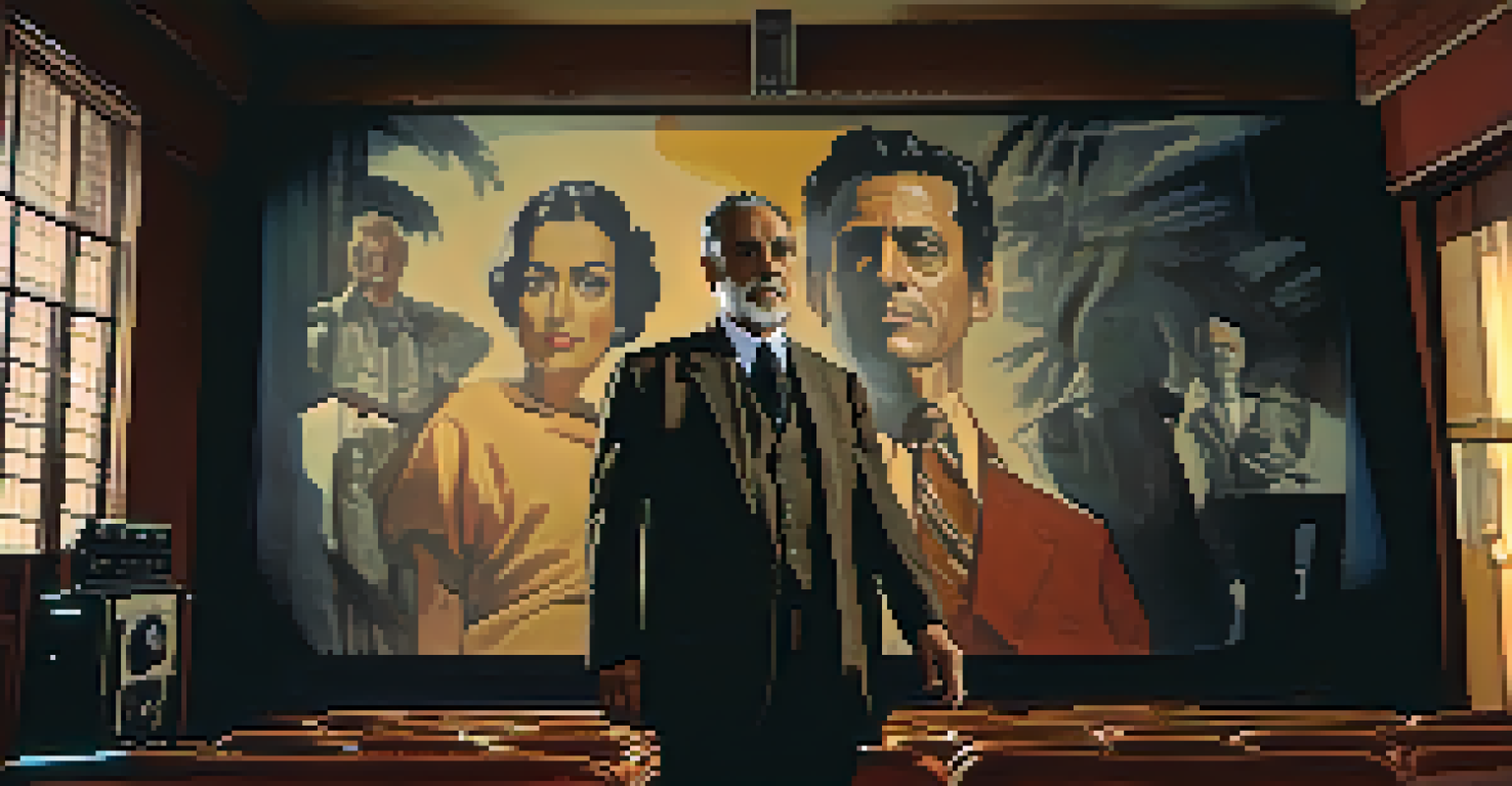Influential Brazilian Directors Shaping Global Cinema

The Rise of Brazilian Cinema in the Global Landscape
Brazilian cinema has made significant strides on the global stage, especially since the late 20th century. Directors like Glauber Rocha pioneered the 'Cinema Novo' movement, emphasizing social issues and artistic expression. This movement laid the groundwork for contemporary filmmakers who blend local narratives with universal themes.
Cinema is a mirror of society, and the stories we tell reflect the struggles and triumphs of our people.
As audiences around the world seek diverse stories and perspectives, Brazilian films offer a rich tapestry of culture, history, and emotion. The rise of streaming platforms has further amplified the reach of Brazilian cinema, allowing directors to showcase their work to a global audience. This shift has transformed how Brazilian stories are told and received.
Notably, filmmakers like Fernando Meirelles and José Padilha have garnered international acclaim, proving that Brazilian stories resonate far beyond their borders. Their ability to tackle universal themes while maintaining local authenticity has opened doors for future generations of filmmakers.
Glauber Rocha: A Pioneer of Brazilian Cinema
Glauber Rocha is often heralded as the father of Brazilian cinema, particularly for his role in the Cinema Novo movement. His film 'Black God, White Devil' is a landmark piece that combines poetic imagery with a critique of social injustices in Brazil. Rocha's work challenged the norms of traditional filmmaking, advocating for a cinema that reflects the struggles of the marginalized.

His approach emphasized the importance of using film as a tool for social change, inspiring countless directors to follow suit. Rocha's films often incorporate elements of Brazilian folklore and history, making them culturally rich and profoundly impactful. This fusion of personal storytelling and broader societal themes has left a lasting mark on global cinema.
Brazilian Cinema's Global Rise
Brazilian cinema has gained international recognition, thanks to its rich narratives and the influence of streaming platforms.
Despite facing censorship and criticism during his career, Rocha's dedication to authentic storytelling paved the way for future filmmakers. His legacy continues to influence contemporary directors who strive to create art that resonates deeply with audiences around the world.
Fernando Meirelles: Bridging Cultures with Film
Fernando Meirelles gained international recognition with his powerful film 'City of God,' which portrays life in the favelas of Rio de Janeiro. This gripping story not only highlights the complexities of urban life in Brazil but also connects with audiences globally. Meirelles' ability to depict raw human emotions and social realities makes his work universally relatable.
The power of cinema lies in its ability to create empathy and understanding across cultures.
His subsequent projects, including 'The Constant Gardener' and 'Blindness,' showcase his talent for adapting complex narratives for diverse audiences. Meirelles often collaborates with international actors and crews, creating a fusion of cultural perspectives that enrich his storytelling. This collaborative approach has helped to broaden the appeal of Brazilian cinema.
Meirelles' films invite viewers to confront uncomfortable truths while also celebrating the resilience of the human spirit. Through his lens, audiences are encouraged to empathize with characters from different backgrounds, further solidifying his role as a key figure in global cinema.
José Padilha: Action and Social Commentary
José Padilha is known for his gripping narratives that blend action with powerful social commentary. His films, like 'Elite Squad,' delve into the complexities of crime and corruption in Brazil, resonating with audiences worldwide. Padilha's work often challenges viewers to reflect on broader societal issues, making his films both entertaining and thought-provoking.
By tackling themes such as violence, inequality, and institutional corruption, Padilha has carved out a unique space in global cinema. His ability to create tension and drama while addressing critical social issues has earned him acclaim and respect. This duality of entertainment and activism is a hallmark of his filmmaking style.
Legacy of Pioneering Directors
Filmmakers like Glauber Rocha and Fernando Meirelles have paved the way for a new generation, blending local stories with universal themes.
Moreover, Padilha's success with international projects, including the Netflix series 'Narcos,' showcases his skill in storytelling across different formats. His work continues to influence how Brazilian narratives are perceived and consumed globally, reinforcing the importance of diverse voices in cinema.
Alice Rocha: Exploring Female Perspectives
Alice Rocha has emerged as a vital voice in Brazilian cinema, focusing on female narratives and experiences. Her films often explore the intersection of gender, identity, and culture, offering a fresh perspective on Brazilian society. By centering women's stories, Rocha contributes to a more nuanced understanding of the complexities within Brazilian culture.
Her critically acclaimed film 'The Second Mother' tackles themes of class and motherhood, resonating with audiences both at home and abroad. Rocha's work highlights the importance of representation in film, challenging stereotypes and advocating for women's voices in an industry traditionally dominated by men. This focus on female empowerment enriches the cinematic landscape.
Through her storytelling, Rocha invites viewers to engage with issues of privilege and inequality while celebrating women's resilience. Her impact on Brazilian cinema is a testament to the power of diverse narratives and the need for more inclusive representation in film.
The Global Impact of Brazilian Directors
Brazilian directors have significantly influenced global cinema by introducing diverse narratives that reflect the country's rich culture. Their films often explore universal themes such as love, loss, and social justice, making them relatable to international audiences. This cultural exchange enriches the global cinematic landscape, showcasing the power of storytelling.
In recent years, the international film community has increasingly recognized the contributions of Brazilian filmmakers, leading to collaborations that transcend borders. Festivals such as Cannes and Sundance have highlighted Brazilian films, providing platforms for these directors to showcase their work. This visibility not only boosts their careers but also promotes Brazilian culture on a larger scale.
Emerging Voices in Filmmaking
A new wave of Brazilian filmmakers is utilizing innovative storytelling and digital platforms to showcase diverse narratives globally.
As Brazilian directors continue to break new ground, their stories resonate with a growing audience eager for authentic and diverse narratives. This shift underscores the importance of inclusivity in cinema, as filmmakers from all backgrounds share their unique perspectives, ultimately shaping a more interconnected global film industry.
Future Directions: Emerging Brazilian Filmmakers
The future of Brazilian cinema looks bright, with a new generation of filmmakers emerging to continue the legacy of their predecessors. Young directors are experimenting with innovative storytelling techniques and exploring contemporary social issues, ensuring that Brazilian cinema remains relevant on the global stage. This fresh wave of talent brings new perspectives and ideas that challenge conventional norms.
Many of these emerging filmmakers are utilizing digital platforms to reach wider audiences, bypassing traditional distribution channels. This democratization of filmmaking allows for diverse voices to be heard and stories to be told, fostering a vibrant cinematic community. As these directors gain recognition, they help to further elevate Brazilian narratives in the global arena.

By embracing new technologies and storytelling methods, these filmmakers are not only preserving the cultural heritage of Brazil but also pushing boundaries. Their creativity and passion ensure that Brazilian cinema will continue to evolve and inspire, solidifying its place in the world of film for years to come.